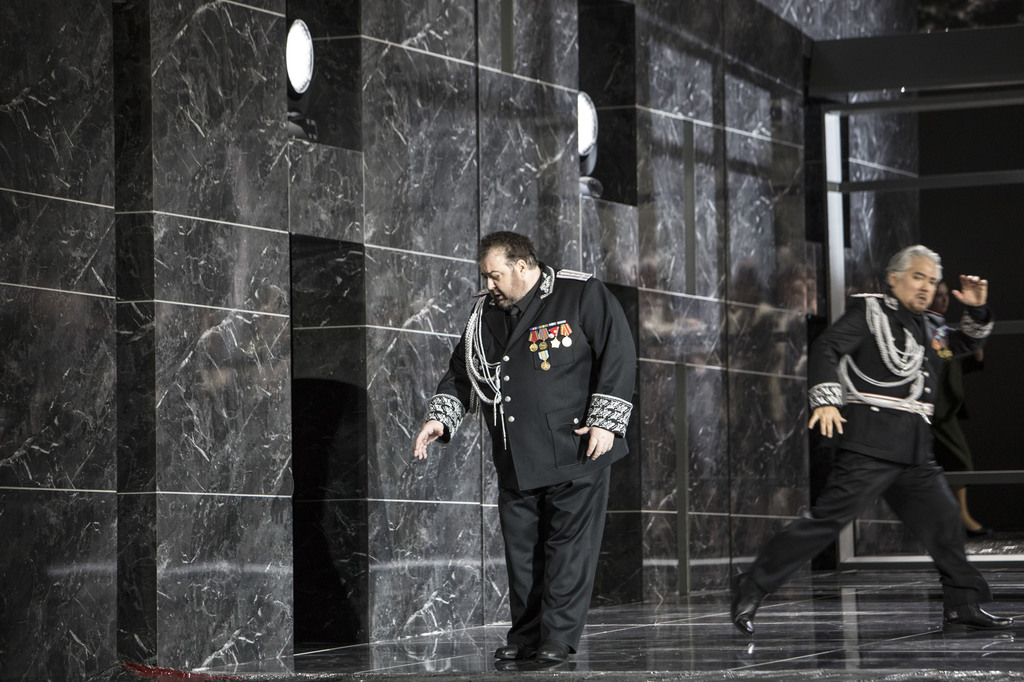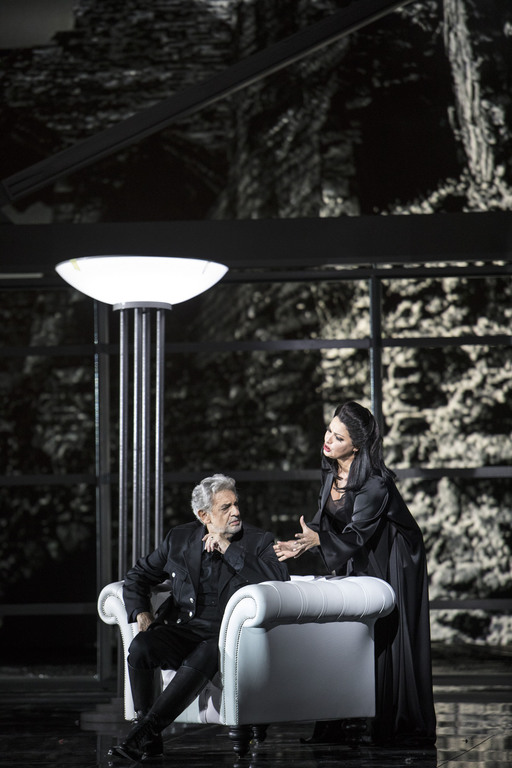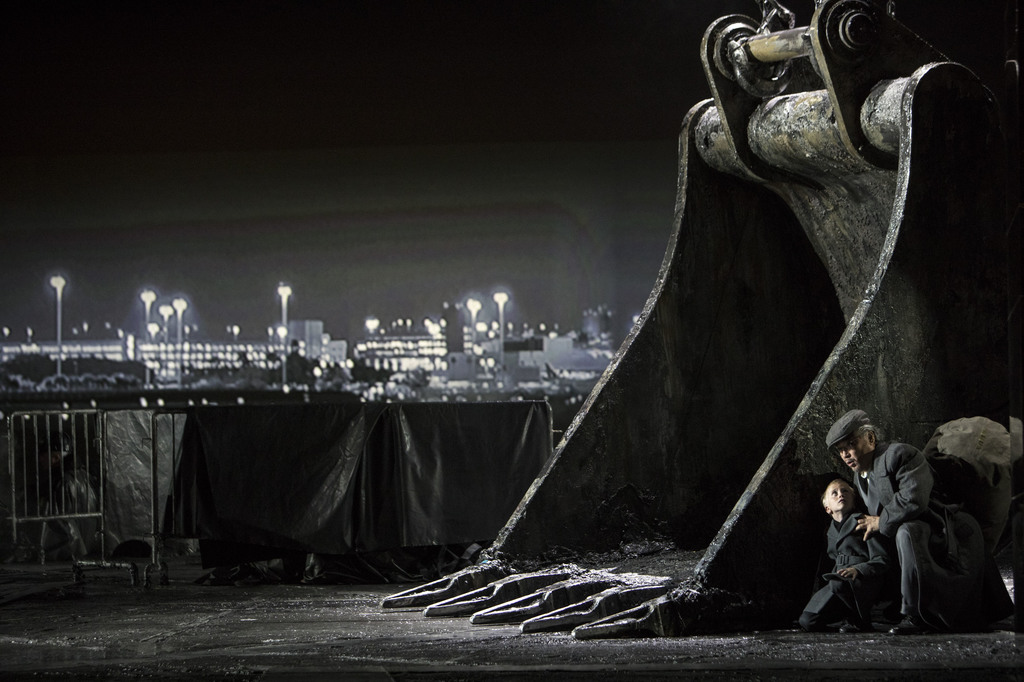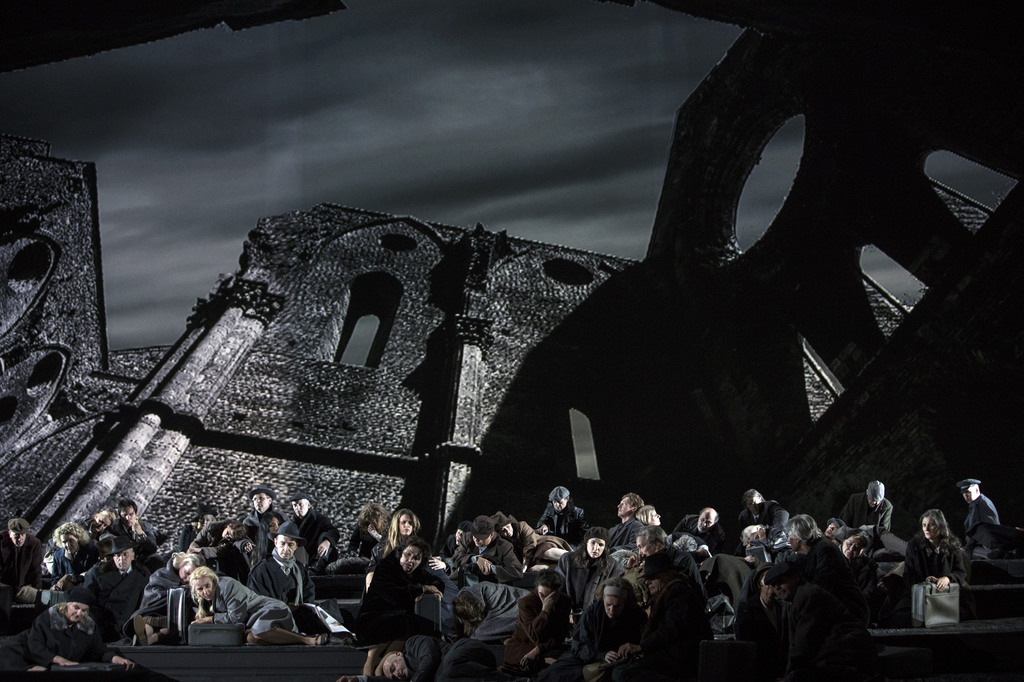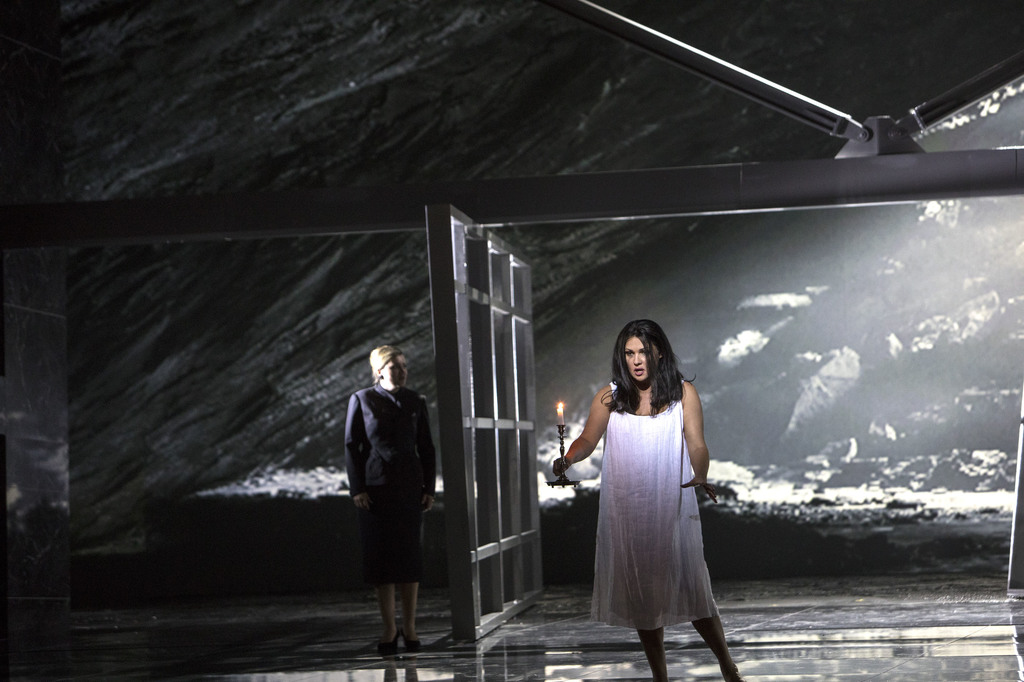Actors
Macbeth
Lady Macbeth
Banco
Crew
Director
Harry Kupfer
Conductor
Daniel Barenboim
Set design
Hans Schavernoch
Costume designer
Yan Tax
Lighting designer
Olaf Freese
Choreography
Helga Schiele
Video
Thomas Reimer
After winning in battle, Commander Macbeth receives a prophesy that he will one day become King of Scotland. Influenced by the whisperings of his wife, he literally stops at nothing to fulfil the prophesy. But racked by guilt, the Macbeths soon sink into delusions and become victims of their own thirst for power.
In order to stay as faithful as possible to the admired Shakespearean play, Giuseppe Verdi’s »Macbeth« shattered the operatic conventions of the time and created one of his darkest and most starkly disturbing works. Monumental choral scenes, echoing the rebellion and disillusionment of the dominated, oppressed and persecuted, demonstrate the social consequences of tyranny and despotism. These contrast with highly expressive arias and duets, in which Verdi transcends the emotional abysses of the power-obsessed protagonists. To express the many-layered motifs and emotions of his characters as diversely as possible, Verdi demanded unprecedented levels of performance from his actors: to enhance the dramatic effect, the vocal parts – instead of shining with virtuoso brilliance – are designed to emphasise aspects of language and acting and are mercilessly subjugated to the specific psychological state of the figures. He thus took a decisive step away from the ideal of the bel canto towards distinctive musical-dramatic veracity.
In order to stay as faithful as possible to the admired Shakespearean play, Giuseppe Verdi’s »Macbeth« shattered the operatic conventions of the time and created one of his darkest and most starkly disturbing works. Monumental choral scenes, echoing the rebellion and disillusionment of the dominated, oppressed and persecuted, demonstrate the social consequences of tyranny and despotism. These contrast with highly expressive arias and duets, in which Verdi transcends the emotional abysses of the power-obsessed protagonists. To express the many-layered motifs and emotions of his characters as diversely as possible, Verdi demanded unprecedented levels of performance from his actors: to enhance the dramatic effect, the vocal parts – instead of shining with virtuoso brilliance – are designed to emphasise aspects of language and acting and are mercilessly subjugated to the specific psychological state of the figures. He thus took a decisive step away from the ideal of the bel canto towards distinctive musical-dramatic veracity.
ACT ONE
The war has wrought death and destruction. Macbeth and Banquo, two of King Duncan’s generals, meet a group of witches after their victorious battle. They predict Macbeth’s rise to ever greater power: he will become Thane of Cawdor and even King, but Banquo will be the father of the kings to come. When Macbeth learns that the first of these predictions has been fulfilled, he is consumed by ambition to wear the royal crown as well.
In a letter from her husband, Lady Macbeth learns of the witches’ prophecies. She is now resolved to convince her husband to seize the chance to take the crown, by any means necessary. When a servant announces the arrival of the King, who wants to spend the night at Macbeth’s castle, the opportunity seems perfect: Macbeth plans to kill the King in his sleep in order to seize power. After completing the deed, which burdens Macbeth’s conscience, suspicion is directed at others. After Macduff and Banquo have discovered the crime, they curse the murderers, including Macbeth and Lady Macbeth.
ACT TWO
Macbeth, now King, finds no peace, he even tries to avoid the Queen. Duncan’s son Malcolm, who has been accused of committing the deed, has fled the country. But now Banquo is also endangered, since as the “father of Kings” will make Macbeth’s long-term rule impossible. Encouraged by Lady Macbeth, he decides to kill Banquo and his son as well. Hired killers slay Banquo, while his son is able to flee.
A celebration is held to honor the new King Macbeth.
Queen Macbeth amuses the guests with a drinking song, while Macbeth is told that Banquo’s death has been achieved. In a vision, the dead Banquo appears to him, and in response, Macbeth loses his composure to the horror of all those present. On the verge of confessing his crimes, Macbeth is prevented from doing so by the Queen at the last second. Macduff, who holds the King responsible for the murders, leaves the country.
ACT THREE
Macbeth wants to achieve certainty about his fate. The witches mention three signs, in part dark and puzzling. He should watch out for Macduff, but “none of woman born shall harm Macbeth.” Ultimately, the prediction gives him a sense of euphoria that he will remain victorious and out of danger as long as Birnam Wood does not begin to move and attack him. In response to his questions, Macbeth learns that Banquo’s descendants will one day take the throne, and he collapses in a swoon.
The Queen finds him in this state, and she encourages Macbeth to rule with fear and terror. Banquo’s son and Macduff should both be killed, along with his family.
ACT FOUR
Those fleeing Macbeth’s regime of terror mourn the repression of their people. Macduff mourns his wife and children, who have fallen victim to Macbeth. Together with Malcolm, he will take up the fight – each warrior should hide with branches from Birnam Wood and advance on Macbeth and his army. A gentlewoman attending the Queen and her doctor observe her walking in her sleep, revealing her guilt. She vainly tries to wash away the blood from her hands. Now lost to madness, she dies. Macbeth, although profoundly disappointed by life, relies on the invincibility that has been foretold to him. But when he is told that Birnam Wood is approaching him, he realizes the scope of the truth. He throws himself into battle.
In the melee, Macbeth meets Macduff, the only one who can annihilate him, since he was surgically removed from his mother’s womb at birth. Fatally wounded, Macbeth curses the crown that has only brought him bad luck. The battle for succession begins immediately.
The war has wrought death and destruction. Macbeth and Banquo, two of King Duncan’s generals, meet a group of witches after their victorious battle. They predict Macbeth’s rise to ever greater power: he will become Thane of Cawdor and even King, but Banquo will be the father of the kings to come. When Macbeth learns that the first of these predictions has been fulfilled, he is consumed by ambition to wear the royal crown as well.
In a letter from her husband, Lady Macbeth learns of the witches’ prophecies. She is now resolved to convince her husband to seize the chance to take the crown, by any means necessary. When a servant announces the arrival of the King, who wants to spend the night at Macbeth’s castle, the opportunity seems perfect: Macbeth plans to kill the King in his sleep in order to seize power. After completing the deed, which burdens Macbeth’s conscience, suspicion is directed at others. After Macduff and Banquo have discovered the crime, they curse the murderers, including Macbeth and Lady Macbeth.
ACT TWO
Macbeth, now King, finds no peace, he even tries to avoid the Queen. Duncan’s son Malcolm, who has been accused of committing the deed, has fled the country. But now Banquo is also endangered, since as the “father of Kings” will make Macbeth’s long-term rule impossible. Encouraged by Lady Macbeth, he decides to kill Banquo and his son as well. Hired killers slay Banquo, while his son is able to flee.
A celebration is held to honor the new King Macbeth.
Queen Macbeth amuses the guests with a drinking song, while Macbeth is told that Banquo’s death has been achieved. In a vision, the dead Banquo appears to him, and in response, Macbeth loses his composure to the horror of all those present. On the verge of confessing his crimes, Macbeth is prevented from doing so by the Queen at the last second. Macduff, who holds the King responsible for the murders, leaves the country.
ACT THREE
Macbeth wants to achieve certainty about his fate. The witches mention three signs, in part dark and puzzling. He should watch out for Macduff, but “none of woman born shall harm Macbeth.” Ultimately, the prediction gives him a sense of euphoria that he will remain victorious and out of danger as long as Birnam Wood does not begin to move and attack him. In response to his questions, Macbeth learns that Banquo’s descendants will one day take the throne, and he collapses in a swoon.
The Queen finds him in this state, and she encourages Macbeth to rule with fear and terror. Banquo’s son and Macduff should both be killed, along with his family.
ACT FOUR
Those fleeing Macbeth’s regime of terror mourn the repression of their people. Macduff mourns his wife and children, who have fallen victim to Macbeth. Together with Malcolm, he will take up the fight – each warrior should hide with branches from Birnam Wood and advance on Macbeth and his army. A gentlewoman attending the Queen and her doctor observe her walking in her sleep, revealing her guilt. She vainly tries to wash away the blood from her hands. Now lost to madness, she dies. Macbeth, although profoundly disappointed by life, relies on the invincibility that has been foretold to him. But when he is told that Birnam Wood is approaching him, he realizes the scope of the truth. He throws himself into battle.
In the melee, Macbeth meets Macduff, the only one who can annihilate him, since he was surgically removed from his mother’s womb at birth. Fatally wounded, Macbeth curses the crown that has only brought him bad luck. The battle for succession begins immediately.
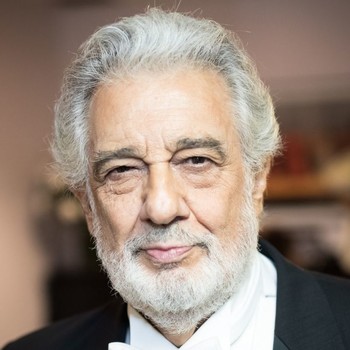

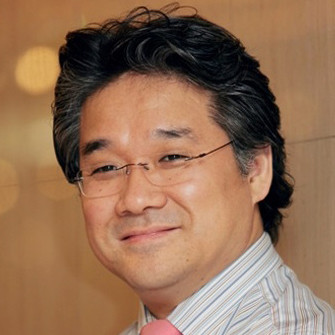



_Bernd_Uhlig_(2).jpg)
_Bernd_Uhlig_(3).jpg)
_Bernd_Uhlig.jpg)
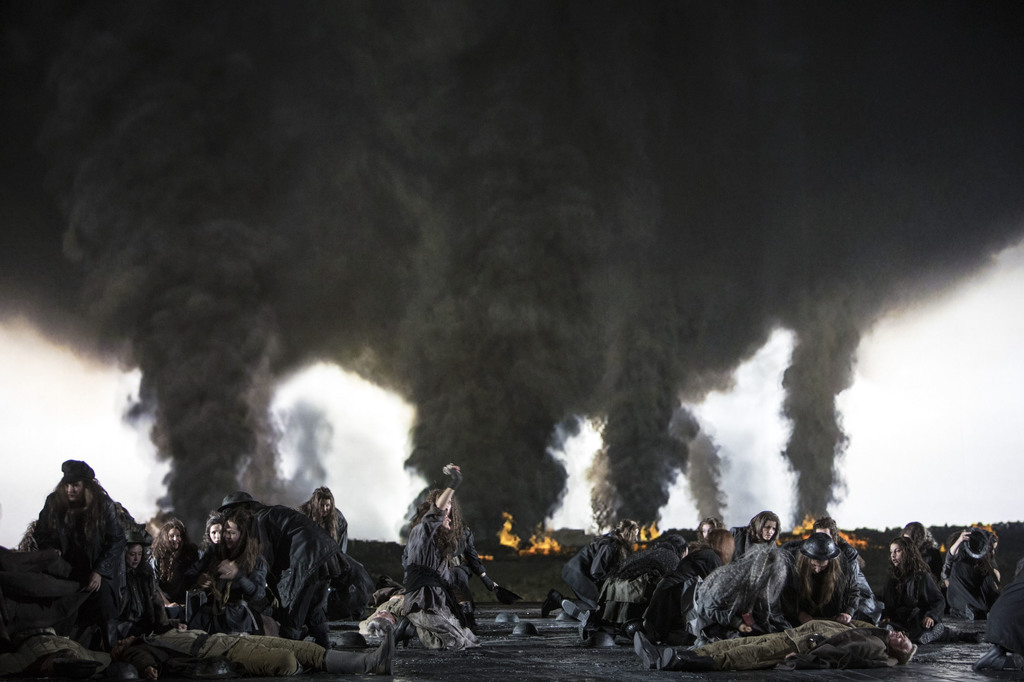
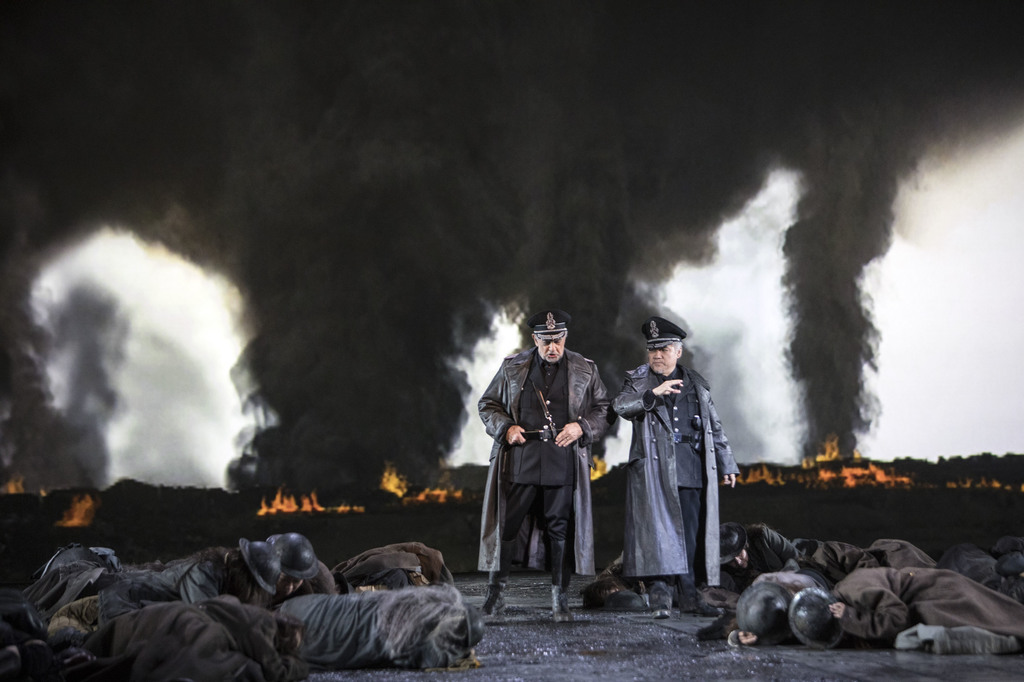
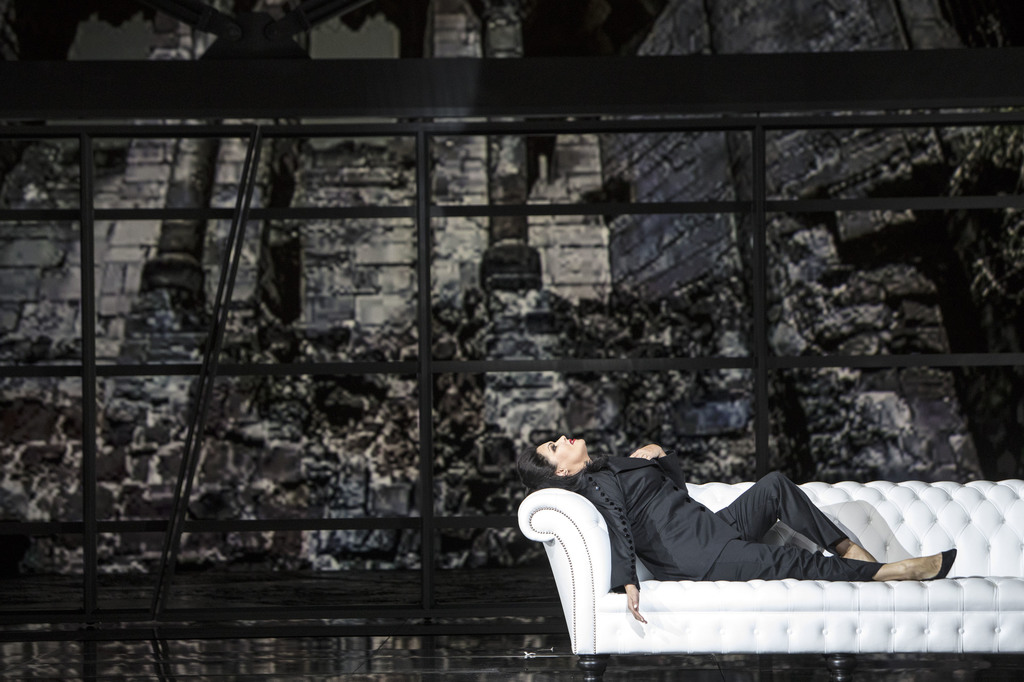
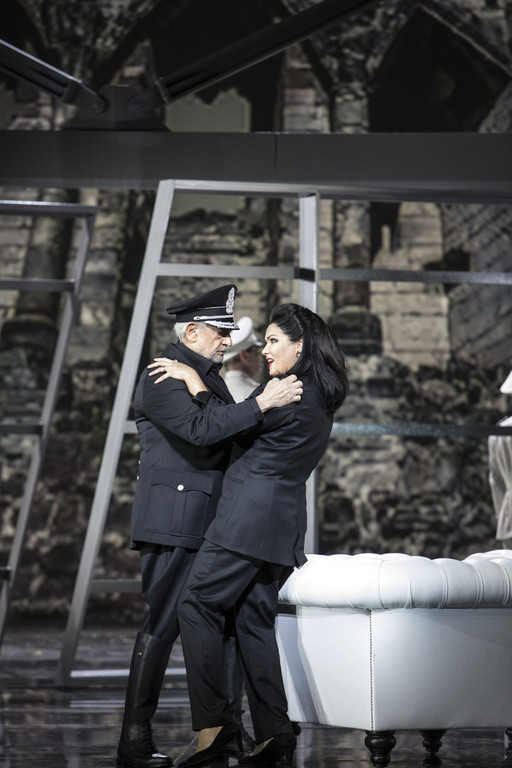
.jpg)
